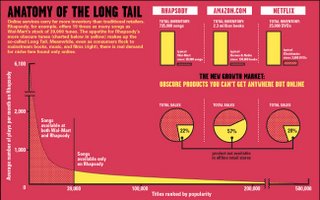This quote from Chris Anderson starts me off on the topic of the Long Tail Effect, an economic model often used to detail the buying trends of online media, such as video and audio. Imagine if you will a huge HMV store in the middle of London, and imagine how many records they sell. You will notice that a vast majority of sales will come from the top 40 records or albums and the further down the charts you delve the more this buying tails off. Until you reach the records that simply aren't purchased more than once or twice a year, and inevitably get removed from the store. In a sense the tail off in sales limits the length of the "tail". However imagine an online record store, shelf space is not required, recommendations are available, and the diversity of tracks available far outreaches that of the average local record store. Niche markets continue to search out old tracks or B-sides that were forgotten by record stores 20 years earlier, the reason being the customer knows they can dig deeper and find what they are looking for, its all out their for them they just have to find it. These trends create the long tail effect, these niche market tracks continue to find an audience even if its just one or two downloads a month, and why? Because an online store can offer far more content to the customer because they're floor space is not limited, they don't push media to customers in the same way as high street stores, the database of tracks is their for users to search, recommend and define for themselves, and ultimatley will pull in the media we want.


No comments:
Post a Comment